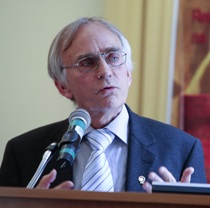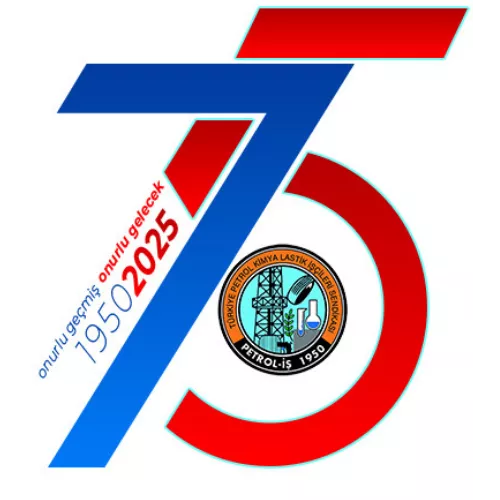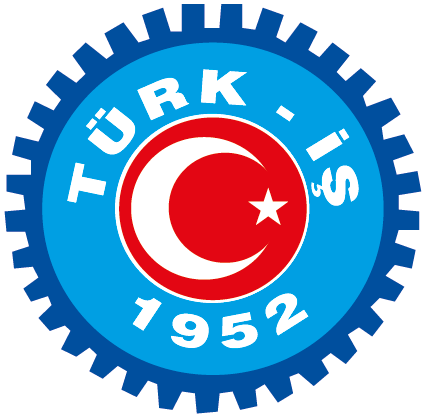
As from the 1st of January 2007, he has taken over the position of General Secretary at the Brussels-based 20-million-member International Federation of Chemical, Energy, Mine and General Workers’ Unions (ICEM) after his long service in German trade union movement, lastly as the Head of the International & European Department of Mine, Chemical and Energy Workers Industrial Union of Germany (IG BCE). Our union Petrol-Is is a long-standing member of this Global Union Federation. After his start at the ICEM, Mr. Warda gives his first interview to Petrol-Is Magazine.
Petrol-Is Magazine : Mr. Warda, first of all, we would like to congratulate you for your election as the ICEM General Secretary. As you know very well, you have become General Secretary of our International at a time when globalisation of capital and transformation of Fordist production system into flexible global production chains in ICEM sectors lead to the emergence of various new workers’ categories. This process undermines the traditional membership base of unions in the world and creates some specific difficulties in union organizing. How can the trade unions overcome these challenges? What policies and strategies should unions develop in this context?
Manfred Warda : Let me first thank you for hosting me at your Magazine. I have a great honour to be together with you and your members through this interview. Petrol-Is is one of the active and important affiliated unions throughout the world and I am very happy to share my views with you as well as with the whole Turkish trade union movement at large.
Regarding your question, you underline very important transformation, which is a fact during the globalization process. The answer of question may not be given with a few words as the whole trade union movement has been trying to find it for many years. However from trade union point of view, in my view, trade unions must always strive for recognition by workers through organising. Valid, legitimate, and honest recognition. With that will come recognition from employers, public and international entities. And that relationship inevitably results in gains in working standards and living conditions. That is the simple strategy. But trade unions must work equally hard, as well, in other aspects of to assure social responsibility. For instance, unions must press international labour standards in place of national labour code when such national or state law is inept. This is particularly the case when employers misuse or manipulate local statutes. ILO Conventions and standards, OECD Guidelines, and other ethical practices must be accepted by multinational companies wherever they operate, no matter how weak or ineffective the local laws are. And when companies do not apply these standards, it is the responsibility of trade unions to act to assure that they do. In this regard, global trade unions must push for new and effective global labour standards that address the changing nature of work in context to globalisation. For instance, there must be global standards set for precarious works covering contract labour and all work done through employment agencies. Trade unions today have a duty to lift the working conditions and the wages and benefits of contract workers. That`s why our International has been carrying out a big campaign for Contract and Agency Labour, and I hope to work actively in this field in Turkey as well.
Petrol-Is Magazine : Mr. Warda, you have outlined the general framework very well. At this point, we would like to ask you a question about a particular working group : White Collars. The new production systems with an advanced technology lead to an increase in the number of white-collar workers while a decrease in the number of blue-collar ones. Unions have some serious difficulties in organizing white-collar workers. What do you think about how trade unions can get the support of these groups, and organise and mobilise them?
Manfred Warda : I think labour unions must realise that work re-organisation will always be a reality, and we must adjust ourselves to new designs and new innovations. We must also be handling the issues of skill development and job enhancement with enterprises. We should not exclusively represent workers who are only organised collectively. But also white-collar and other such workers do have employment issues, whether it is balancing work and home, or specific job situations, or any number of other things. We must address their issues and when we do, we will realise that their insights and skills are exactly what it takes to build a stronger and more unified trade union. Actually I personally do have experiences from my work in at home country where our German affiliated union IG BCE has a special project that supports and empowers grouping of just such employees, and this has brought good achievements to the union activity, in particular in the sectors like pharmaceuticals where the proportion of this type of workers is relatively higher. In this connection, exchanging information among union organisations from different countries could play a productive and useful role. As the ICEM, we are always ready to assist you for such exchanges.
Petrol-Is Magazine : Dear General Secretary, another question is about consolidation of unions` power. While trade unions within the same sector or industry in the world tend to merge into one organisational structure, we don’t observe such a trend among unions in Turkey yet. Have you any message to give the unionists in Turkey in this respect?
Manfred Warda : I think the simple fact is that when trade unions are the most unified, they are the strongest. This the reality. This does not mean that mergers have to be the whole rule of the day. Trade unions within sectors, across sectors, and across borders have to be in sync with each other, and they have to be open, at least, for exchange of information and for meaningful engagement and discussions on relevant issues and situations. This is particularly important to gain political influence, and to have a real influence on job conditions. The global trade union movement will definitely be stronger when all global unions are united. As you know, in 1995, the Miners`International Federation (MIF) and the International Federation of Chemical, Energy and General Workers` Unions (ICEF) decided to merge and the ICEM was born. This is always an important theme on the agenda of international trade union movement. I am sure you know that all the Global Union Federations and the newly-established ITUC have decided to create Global Union Council for this purpose. We do believe that we can be much more stronger and effective if we consolidate our powers. But it is obvious that international trade union organisations will be stronger even further when national unions are united. At the point this is my message in response to your question.
Petrol-Is Magazine : Mr. Warda, the EU membership issue is a live discussion in Turkey for a long time. Even since 1963 when Ankara Agreement with European Communities then was signed. Within the context of the membership negotiations between Turkey and EU, various EU bodies and official representatives highlight such issues as alignment with EU, democracy and human rights in general, however, issues regarding trade union and workers’ rights and freedoms and labour relations are ignored by the same circles. What are your comments in this respect?
Manfed Warda : As the ICEM, regarding the relationship between Turkey and the EU, we back the position and activities of our European sister federation, the European Mine, Chemical and Energy Workers’ Federation (EMCEF). In this framework, Turkey’s integration into the EU is supported by us, and your country is expected to make significant progress on human and social rights and trade union freedoms in accession talks. We strongly address the integration from a trade union perspective, and that is right and proper. That is, regarding the right to bargain collectively, and other trade union rights and freedoms, Turkey’s government must do more to guarantee such rights. I think there is a long way for Turkey to do so. As the international trade union movement, we are always together with you, and try to do many things to accelerate this process. I do believe for our sectors we have shown this initiative and solidarity through various activities. For example, this was made clear by being held EMCEF’s 7th General Assembly, held in Istanbul in June 2006 where a specific decision was produced for backing Turkish trade union movement in the EU process, and the ICEM totally supports this position.
Petrol-Is Magazine : Petrol-Is attaches utmost importance to the global framework agreements signed by the ICEM with transnational companies, and wants these agreements to be more effective and more inclusive. How should the national union organizations in the ICEM sectors approach to the GFAs? In this context, what are the challenges on their agenda?
Manfred Warda : Let me first tell you my happiness to hear your view about Global Framework Agreements. The ICEM itself considers this very important and works on it hardly. I believe that the GFAs only are as strong as the affiliated trade unions in the countries where signatory companies operate in want them to be. What that means is that the necessary information exchange between affiliates and the ICEM must be in place. We must get specific information on workplace deficiencies, whether it is safety and health, on a labour issue, or a social aspect that is being neglected. We must get accurate information that we can bring forward. When we do, and this is occurring more and more, we are able to address, and then correct the problem. We have witnessed signatory companies take very seriously their responsibilities when issues are brought before them. In most cases, they have been unaware of them. It must be remembered, however, Global Framework Agreements do not replace collective bargaining agreements at the local level. It is in that process in which the correct work practices are set and established.
Petrol-Is Magazine : As you know, women workers of Petrol-Is employed by Fresenius Medical Care in the Antalya Free Trade Zone have been on strike since 26 September 2006, due to the management’s attitude that is unwilling to come to an agreement. While Fresenius Medical Care concludes collective agreements in European countries (Germany, Italy, etc.), why doesn’t the same multinational company sign an agreement in Turkey?
Manfred Warda : The Fresenius struggle is a prime example of a company misusing Turkish labour laws. And it also serves as an excellent case example on EU integration, about which we discussed in relation to the question above. In any honest Turkish accession talks, the question must get asked: Should a European-based company be allowed to behave one way in an EU nation, and yet another way in Turkey, regarding labour relations? The ICEM, since the conflict has emerged, handles it and supports Petrol-Is in this rightful struggle. We also back the initiatives taken jointly by our sister organisation EMCEF and our German affiliate IG BCE in this dispute. We were very proud to proclaim courageous stand of strikers, under the banner of Petrol-Iş, of course, on International Women’s Day, March 8. The degrading conditions that these workers – mostly women – have to endure were heard by many people across the world. This is a dispute that the ICEM will closely monitor and keep in civil society’s full and open view. However you should know that this is the struggle of the whole trade union movement, and Petrol-Is and our sisters and brothers in Antalya are not alone.
Petrol-Is Magazine : Dear General Secretary, thank you for taking time for us. Finally which message would you like to give us?
Manfred Warda : Many thanks also from my side for giving me this opportunity. I ask you to send cordial fraternal greetings and solidarity feelings of the ICEM, our 20 million members throughout the world and myself. I know this year is your Congress year. I am sure you will produce many resolutions, action plans and programmes for your members as well as for the whole union movement. I wish you great success. I do believe your commitment and decisiveness for international trade union will continue as has been done so far. As you know, this year is also ICEM`s Congress year, which will take place in November in Bangkok, Thailand. I look forward your active participation at the preparations as well as at the Congress itself. Live Long International Solidarity!





